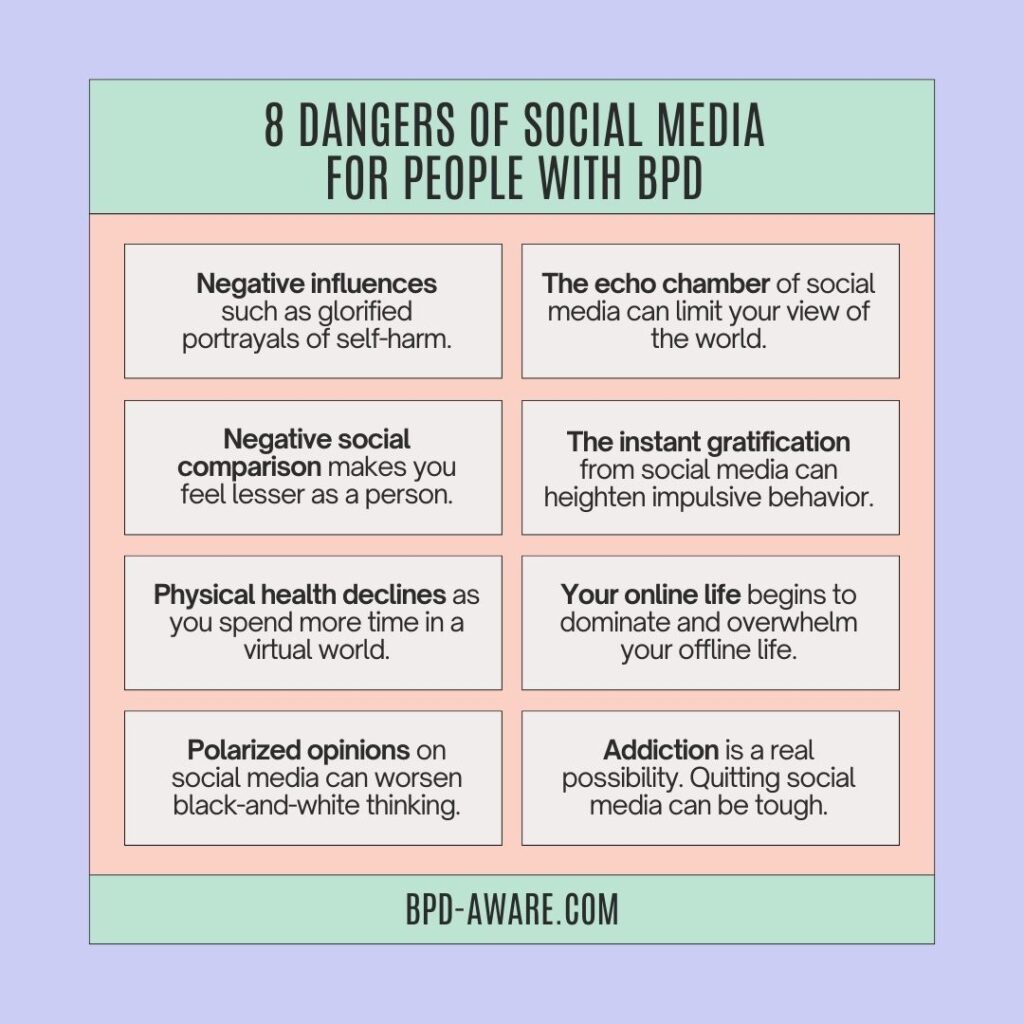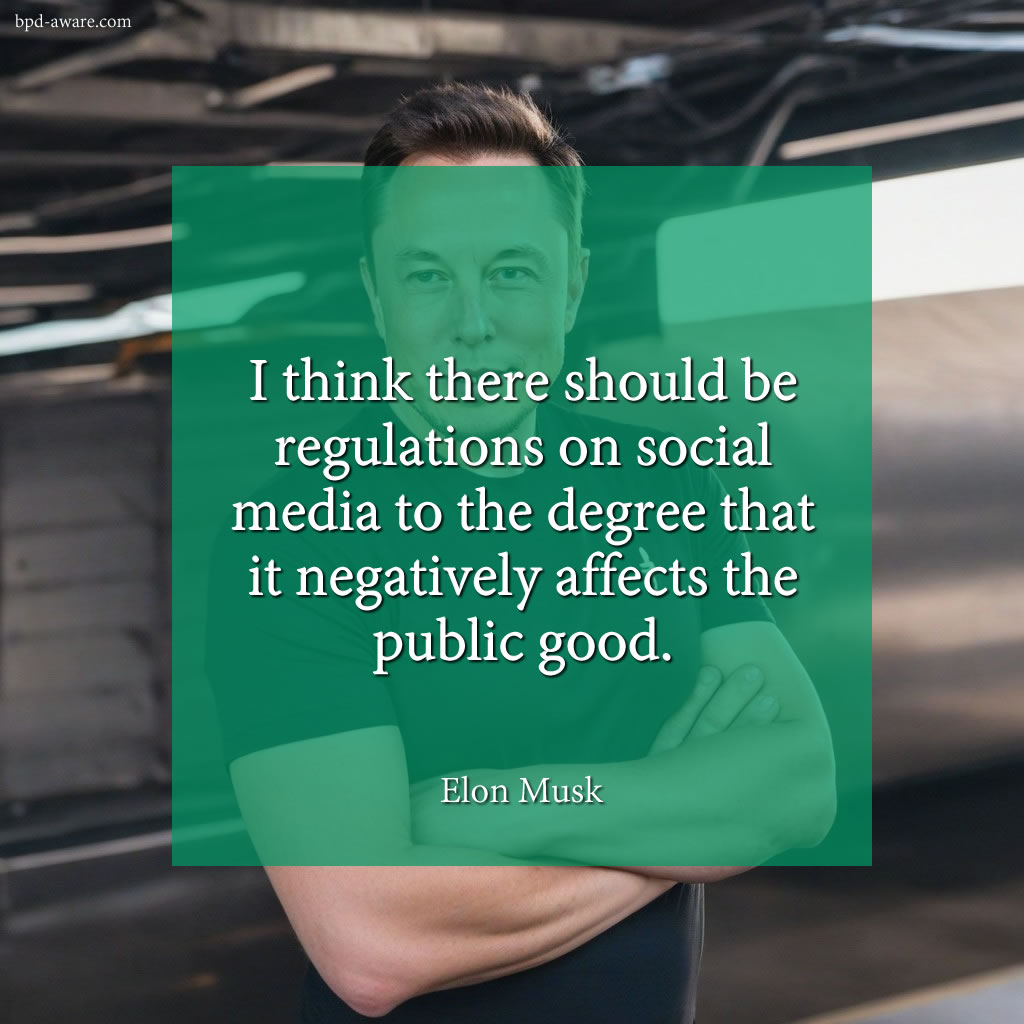Social media has become a major part of modern life, offering various ways to connect, share, and express oneself. For individuals with Borderline Personality Disorder (BPD), social media can be a double-edged sword.
There are an overwhelming number of social media sites these days. Whether it’s Facebook, Instagram, Reddit, Twitter (X), TikTok, Tumblr, or Pinterest, social media has revolutionized how people communicate and connect. It allows people to stay in touch with family and friends, connect with new people, and join communities of like-minded individuals, regardless of geographical distances.
While social media offers opportunities for support and engagement, there is growing concern about its impact on mental health, including issues related to self-esteem, loneliness, and addiction.
But what does this mean for people with BPD? Should we delve head-first into social media or shun it altogether? This article aims to look at the role that social media can play for people with Borderline Personality Disorder and how best to harness it while avoiding the more negative aspects.
Benefits of Social Media for People with BPD
Community and Support: Social media platforms provide individuals with BPD access to online communities and support groups. These groups provide a sense of belonging and understanding, which can be particularly valuable for individuals who may feel isolated or misunderstood offline. Reading about others’ experiences with BPD can provide insight and perspective. Seeing how others have navigated similar challenges can offer hope and inspiration.
Self-expression and Identity Formation: Social media allows for creative self-expression, which can be therapeutic for people with BPD. It enables them to explore and articulate their identity in a controlled environment, which can be beneficial for self-esteem and personal growth.
Social media can provide a platform where individuals feel comfortable expressing their thoughts and feelings. This can be particularly helpful for those with BPD who might struggle with intense emotions and seek a safe outlet for expression.
Access to Information: Individuals with BPD can use social media to access a wealth of information about their condition, including treatment options, coping strategies, and the latest research. This knowledge can empower them to manage their symptoms better and seek appropriate help.
Hint: You can follow BPD-Aware at the following places: Facebook, Twitter (X), Tumblr and Pinterest.
Mood Regulation: For some, engaging in positive interactions on social media can boost mood and provide a distraction from distressing thoughts or feelings. Sharing achievements and receiving positive feedback can be uplifting. Some use social media as a form of mood tracking or journaling, posting about their daily experiences and emotions. This can help in reflecting on patterns over time and understanding triggers.
Entertainment: Social media offers a whole new world of entertainment, allowing users to share and consume a wide range of content, including music, videos, art, and literature. Entertainment can help take your mind off your problems and self-soothe during a crisis.
Dangers of Social Media for People with BPD
Emotional Volatility and Triggers: Social media can be a minefield of triggers for individuals with BPD. Negative interactions, such as cyber-bullying or conflicts, can exacerbate symptoms like mood swings, anger, and feelings of rejection or abandonment. A bad interaction on social media can literally ruin your day.
Misinformation and Negative Influence: The internet is rife with misinformation and potentially harmful content. People with BPD might come across glorified portrayals of self-harm, substance abuse, or other destructive behaviors, which can be particularly influential. Similarly, there are people on social who identify as having BPD based on a self-diagnosis. While it may not be their intent to misinform, it can provide an unreliable narrative which can cause harm.
Social Comparison and Low Self-esteem: Platforms that emphasize image and status can lead to detrimental social comparison, affecting self-esteem and body image. For someone with BPD, this can intensify feelings of inadequacy and worthlessness.
Impulsivity and Risky Behavior: The impulsive nature of BPD can be amplified by the instant gratification and anonymity offered by social media. This can lead to oversharing personal information, engaging in online conflicts, or other risky behaviors.
Over-reliance and Addiction: There is a risk of becoming overly reliant on social media for validation and support, which can lead to addictive behaviors. This overuse can detract from real-life relationships and activities, further exacerbating feelings of loneliness and emptiness.
Echo Chambers and Polarization: Social media algorithms tend to show users content that aligns with their views, creating echo chambers. This can reinforce beliefs and opinions, reducing exposure to differing perspectives and contributing to societal polarization. When you couple this with the BPD tendency to think in very black-and-white terms, this can make beliefs even more binary.
Reduction in Face-to-Face Interactions: Over-reliance on social media for socialization often leads to fewer face-to-face interactions, which are essential for developing and maintaining meaningful relationships and for the development of social skills. Socializing has been found to have a positive impact on mental health.
Impact on Physical Health and Productivity: Prolonged use of social media can create a sedentary lifestyle, which can lead to various health issues like obesity, cardiovascular problems, and musculoskeletal problems. Physical health also has a strong impact on mental health. Social media can be a significant distraction, impacting productivity in academic goals, work settings, and life in general. The constant notifications and urge to check updates can interrupt focus and reduce efficiency.

Balancing Act: Navigating Social Media with BPD
For individuals with BPD, navigating social media requires a careful balance. It is important to be mindful of how time spent online impacts mental health and to set boundaries to protect oneself. Here are some strategies:
Limiting Time Online: Setting time limits for social media use can prevent overuse and reduce exposure to potential triggers. Many social media platforms and smartphones have built-in tools to track and limit your usage. Features like screen time reports and app limits can help you reduce your usage and stick to your goals. Disable social media notifications or set your phone to “Do Not Disturb” mode during certain hours to minimize distractions and the urge to constantly check your phone.
Curating a Positive Feed: Actively managing who and what you follow can create a more positive and supportive online environment. Actively seek out and follow accounts that post content that is uplifting, educational, or inspirational. This could include pages related to hobbies you enjoy, motivational speakers, educational institutions, positive news outlets, or content creators who align with your values.
If certain accounts or people consistently post content that makes you feel anxious, sad, or negative in any way, don’t hesitate to unfollow or block them. If unfollowing isn’t an option (for instance, if it’s a family member or a close friend), use the mute feature to hide their posts from your feed.
Developing Awareness: Being aware of the triggers and signs of emotional distress while using social media can help in taking holistic measures to manage reactions. Be aware of how you’re feeling as you scroll through your feed. If something makes you feel down, take action by adjusting your feed accordingly and/or closing the app.
Seeking Professional Help: Discussing your social media use with mental health professionals can provide tailored advice and coping strategies. Often, people turn to social media as a way to cope with stress.
Therapy can teach healthier stress management techniques like relaxation exercises, physical activity, and time management. CBT is particularly effective for treating addictions, including social media addiction. It helps individuals identify and change negative thought patterns and behaviors. For social media addiction, CBT can help in recognizing triggers that lead to excessive use and developing healthier coping mechanisms.
Focusing on Offline Relationships: Balancing online interactions with face-to-face connections can help maintain a healthier perspective and reduce dependency on social media for social fulfillment.

Final Thoughts
In conclusion, the relationship between Borderline Personality Disorder and social media is a complex one. While social media can offer genuine opportunities for people with BPD to connect, express themselves, and find support, it also presents potential risks that must be navigated with care. The benefits, such as building supportive communities, accessing resources, and sharing experiences, can be significant. These positives can lead to feelings of connection, validation, and even provide educational insights into managing the disorder. However, the potential negatives – like the exacerbation of BPD symptoms, exposure to triggering content, and the risk of addictive behaviors – cannot be overlooked.
The key for people with BPD to leverage social media positively lies in mindful usage, setting clear boundaries, and being aware of the content they consume and interact with. It is crucial for users to critically assess how their social media habits affect their mental health and overall well-being. For some, this may mean limiting their time on these platforms, engaging in digital detoxes, or curating their feeds to minimize exposure to harmful content. For others, it might involve seeking professional guidance to navigate these digital spaces in a way that supports their mental health.
Ultimately, social media is neither inherently good nor bad. Its impact depends on how it’s used. For people with BPD, as with anyone, social media can be a tool for positive growth and connection, provided it is used thoughtfully and responsibly. As we continue to embrace the digital age, understanding and addressing the challenges faced by people with mental health conditions like BPD in online environments is essential. By doing so, we can ensure that social media is a space that supports, rather than hinders, mental health and well-being.
Sources, Resources, and Further Reading
- Social media’s impact on our mental health and tips to use it safely: https://health.ucdavis.edu/blog/cultivating-health/social-medias-impact-our-mental-health-and-tips-to-use-it-safely/2024/05
- Social Media Addiction and Mental Health: The Growing Concern for Youth Well-Being: https://law.stanford.edu/2024/05/20/social-media-addiction-and-mental-health-the-growing-concern-for-youth-well-being/
- BPD and Social Media: Exploring Online Interactions: https://www.mentalcurve.com/post/bpd-and-social-media-exploring-online-interactions
- “It Was Really Toxic”: People Who’ve Quit Or Cut Back On Social Media Are Opening Up About How It Affected Them: https://www.buzzfeed.com/meganeliscomb/why-people-quit-social-media
















